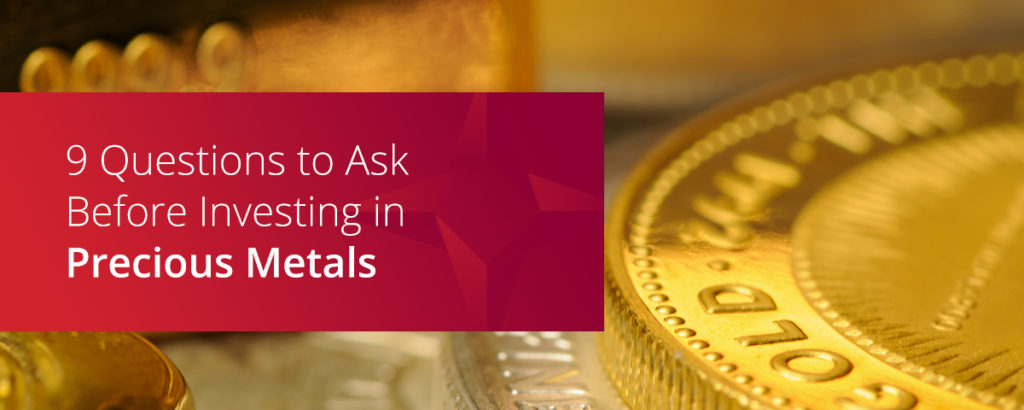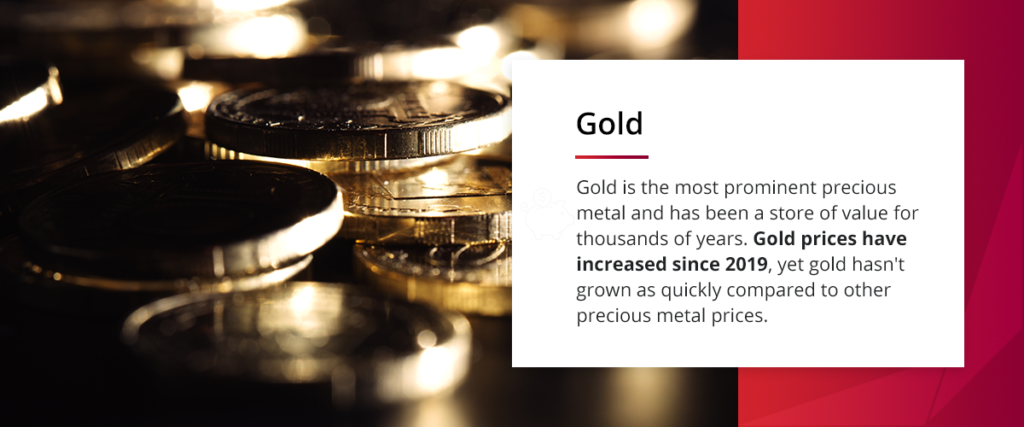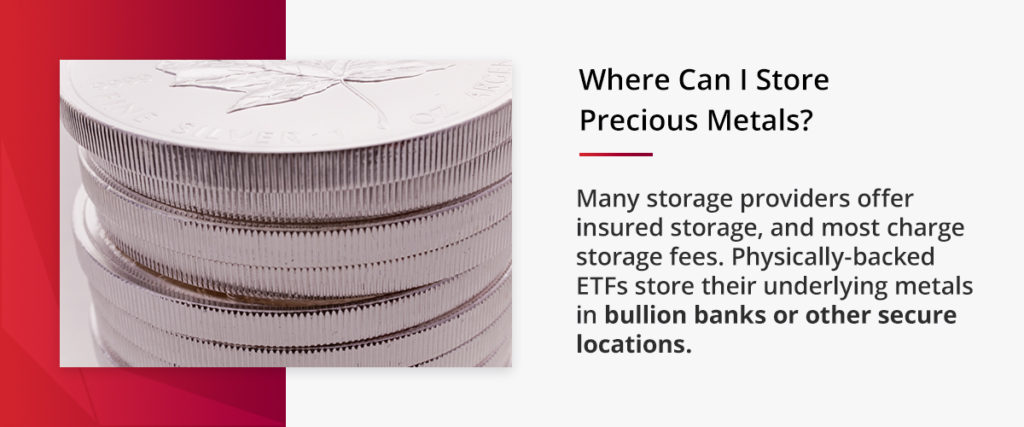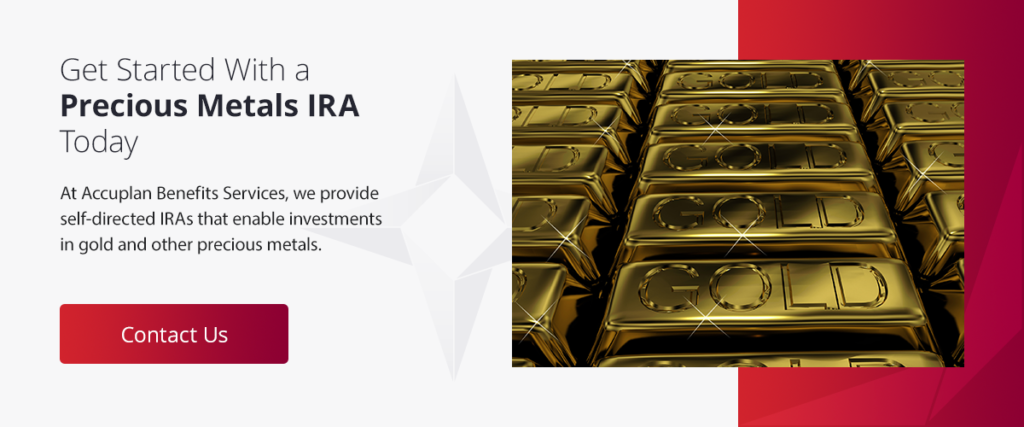
Precious metals have long been considered valuable investments and are often featured in investors’ portfolios. Savvy investors may invest in precious metals to diversify their portfolios, reduce portfolio volatility and protect assets against inflation.
If precious metals may be in your investment strategy, there are a few things to remember. Precious metal investment carries risk and reward and comes with a few unique considerations. Ultimately, whether you should invest in precious metals depends on several factors and your personal financial goals.
Use a few strategic questions to take stock of your investment objectives before investing in precious metals.
9 Questions to Ask Before Investing in Precious Metals
Precious metals are a popular alternative investment for several reasons. Some of the top explanations for why investors are drawn to precious metals include:
- Protection against upheaval and inflation
- Intrinsic value
- Lowering the volatility of an investment portfolio
While you might find these benefits of precious metal investment appealing, it’s crucial to recognize the potential risks and special considerations of investing. For example, precious metals are still subject to the risk of loss and price fluctuations.
Ask yourself these nine questions before you commit to investing in precious metals to determine if the investment is suitable for you:
1. Which Form of Precious Metal Is Best?
Precious metal investment can take several forms, the best-known being physical precious metals in the shape of bars and coins. Physical precious metals are typically a safer investment than other forms because they grant direct ownership to the owner and allow physical delivery of the metals.
Another option for investing in precious metals is through physically-backed exchange-traded funds (ETFs). These ETFs track the spot price — the market price — of precious metals and provide beneficial ownership of the metal in the fund. Physically backed ETFs are also considered safer forms of investing in precious metals, although they typically don’t allow the investor to take physical delivery of the underlying metal.
A riskier way to invest in precious metals is through forms unbacked by physical metals, like gold futures contracts or certificates. These investments don’t grant a title of ownership and don’t allow investors access to the metal.
2. Which Precious Metals Can I Invest In?
Investors may select from several precious metals, including:

- Gold: Gold is the most prominent precious metal and has been a store of value for thousands of years. Gold prices have increased since 2019, yet gold hasn’t grown as quickly compared to other precious metal prices.
- Silver: Silver has a wide range of uses, from its role as a store of value to industrial applications. The impact of its industrial uses makes silver’s price more volatile than gold’s.
- Platinum: This lesser-known precious metal is rarer than gold and may fetch a higher price during periods of economic stability. Platinum has applications in the automobile industry, jewelry and in chemical refining.
- Palladium: The price of palladium is also highly influenced by its many applications. This rare metal is more sensitive to changes in the market than the other three precious metals.
3. Should I Choose an Allocated or Unallocated Account?
Allocated and unallocated accounts store and treat precious metal investments differently. Allocated accounts are backed by physical precious metals that an investor stores in a secure warehouse. These metals provide an ownership title and a higher degree of investor safety.
Unallocated metals do not provide an ownership title to the holder because they function as credit accounts. Unallocated accounts can be overdrawn, turning an investor into an unsecured creditor if the issuer goes bankrupt. However, unallocated accounts are convenient and fast.
4. What Is the Markup Over Spot Prices?
Precious metals dealers must charge markups to cover overhead costs like shipping, insurance, storage and labor. Markup amounts vary by the product’s rarity, purity and volume and the dealer’s inventory. In addition, ETFs are typically bought and sold for a smaller markup over the spot price than physical precious metals, yet ETFs also charge annual management fees.
Closely comparing markup or management fees among several dealers and ETFs gives you a better indication of the investment cost.
5. How Liquid Is an Investment in Precious Metals?
Investment liquidity is a vital consideration. Many investors choose to invest for the long-term, but being able to sell an investment quickly may be beneficial in certain situations. Some forms of precious metal investment are more liquid than others, with ETFs topping the list. Investors can buy and sell ETFs multiple times a day since they are traded on an exchange. Physical precious metals are more difficult to buy and sell.
6. Where Can I Store Precious Metals?

Physical precious metals come with the need for storage, making this form of precious metal cumbersome to manage. Keeping physical precious metals in an allocated account gives investors peace of mind. Many storage providers offer insured storage, and most charge storage fees. Physically-backed ETFs store their underlying metals in bullion banks or other secure locations.
7. Are There Ongoing Costs of Precious Metal Ownership?
All forms of precious metal ownership charge ongoing costs, an essential factor investors should consider. For example, storing physical metal bars or coins in a storage facility will induce storage and insurance costs. ETFs charge annual management fees to provide the management company with a profit.
8. How Does the IRS Tax Precious Metals?
The IRS taxes certain precious metals as collectibles, but not specific coins and bullion of gold, silver, platinum and palladium held in individual retirement accounts (IRAs). According to IRC Section 408(m), these coins must meet strict requirements regarding fineness, design and purity. Any bullion must be in the possession of a trustee or a bank. The IRS taxes these precious metals according to the type of IRA they are in — traditional IRAs are taxed on distributions, while Roth IRAs are made with after-tax dollars.
9. Is a Precious Metal IRA a Good Idea?
Some investors use their IRAs to fund their gold investments. This strategy allows investors to use their retirement funds to finance investments in gold while profiting from the lower storage costs their IRA provider offers. Investors can find self-directed precious metal IRAs through an IRA provider with decades of industry expertise to ensure their self-directed IRA stays fully legal with the IRS, potentially making a gold IRA a good investment.
Deciding whether a gold IRA is a good idea depends on an individual’s financial goals. Investors should also be aware that a self-directed precious metal IRA may require precious metals of a certain fineness.
Get Started With a Precious Metals IRA Today

Investing in precious metals can provide numerous benefits for investors. At Accuplan Benefits Services, we provide self-directed IRAs that enable investments in gold and other precious metals. Our IRA professionals are experts in the specific rules applicable to IRAs and precious metal investments, so we can keep your account legal with the IRS. We also offer competitive IRA account and storage fees.
Learn more about our self-directed precious metals IRAs and start an account today. You can also contact us to discuss your options and find dedicated assistance.
Our information should not be relied upon for investment advice but simply for information and educational purposes only. Our information is not intended to offer, nor should it be relied on, for investment, legal, accounting or tax advice.